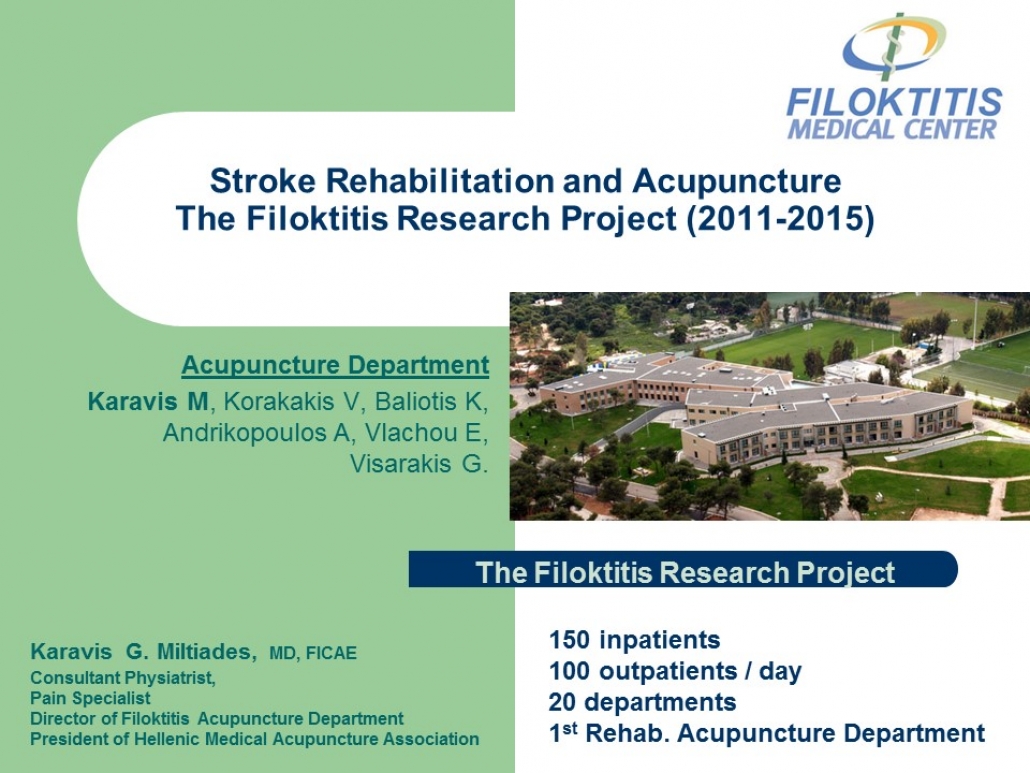
Ομιλία του ιατρού Καράβη Μιλτιάδη στο 4th Romanian National Congress of Integrative Medicine with International Participation, RO-INMED 2015 Διαβάστε το abstract: There are many issues that make it difficult to conduct a research in order to investigate the efficiency and effectiveness of acupuncture on post-stroke rehabilitation. Series of clinical trials in recent years have shown that acupuncture, as an ancient technique of peripheral sensory stimulation, regulates cerebral microcirculation, cerebral hemodynamics, brain metabolism, focal neuronal activity and function of specific brain regions. Animal studies support also the hypothesis that acupuncture inhibits post-ischemic inflammation, promotes neurogenesis and angiogenesis, increases neurotrophine and BDGF concentration and, as a form of sensory stimulation, induces sensory-dependent neural plasticity. Clinically, there are some reports (small sampled, low quality) that acupuncture improves motor function and balance, upper and lower limb spasticity, self-care ability and quality of life. Furthermore, acupuncture is claimed to be effective in insomnia, anxiety and depression. Finally, some acupuncture points show a specificity on cognitive function (memory, attention, concentration, vocational ability) and their use are considered of great importance on stroke rehabilitation. That is the reasons why we decided to include acupuncture as a commonly used technique in our stroke rehabilitation unit. Given the former, in Filoktitis Rehabilitation Centre, Athens-Greece, we conducted (starting from 2011) a preliminary study regarding the effect of TCM acupuncture and electro-acupuncture, on short and long term outcome, in a cohort of 160 patients (86 men (54%) and 74 women (46%), mean age±SD 41.1 ± 16.6 years). The main objective of this preliminary study was to assess the effect of an additional (acupuncture) intervention, in parallel with a routine stroke pharmacological treatment and rehabilitation program, in a sample of subjects with a wide spectrum of neurological conditions, but especially on stroke patients. Based on data provided by our experience and the present preliminary study, we aim to assess the effect of electro-acupuncture, TCM acupuncture or a combination of both on a bigger cohort of patients and their short and long term outcomes. The main objectives of this study were the assessment of treatment strategies concerning plasticity of the nervous system, amendment of rehabilitation and improvement of short and long term functional and physical outcomes. The design of the present research project (The Filoktitis Research Project) is multidimensional. Basically in order to evaluate baseline characteristics and treatment outcomes in evidence based medicine, we had to use valid and reliable tools. The majority of the scales and questionnaires used in rehabilitation medicine are not validated in Greek language for Greek speaking patients, assessors and clinicians. One of our objectives is to formally translate, adapt and validate key scales and questionnaires in Greek language such as, UK FIM+FAM and modified Ashworth Scale. Furthermore, we aim to assess the test-retest reliability of the scales by examining the inter-rater and intra-rater reliability. Finally, in a randomized-controlled design we aim to evaluate the effect of TCM (combined or not with electro-acupuncture) in big cohort of patients in our rehabilitation Centre. In this presentation we will present you our latest data and we will share with you the challenges and problems we face in our daily routine using acupuncture in stroke survivors.
